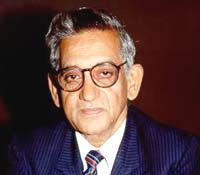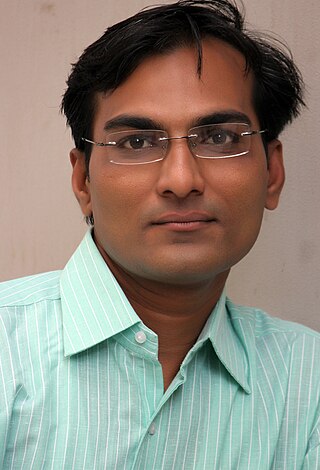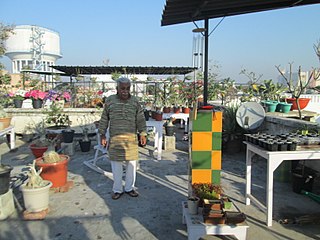Indian poetry and Indian literature in general, has a long history dating back to Vedic times. They were written in various Indian languages such as Vedic Sanskrit, Classical Sanskrit, Ancient Meitei, Modern Meitei, Telugu, Tamil, Odia, Maithili, Kannada, Bengali, Assamese, Urdu, and Hindi. Poetry in foreign languages such as English also has a strong influence on Indian poetry. The poetry reflects diverse spiritual traditions within India. In particular, many Indian poets have been inspired by mystical experiences. Poetry is the oldest form of literature and has a rich written and oral tradition.

Ramakanta Rath is one of the most renowned modernist poets in the Odia literature. Heavily influenced by the poets such as T. S. Eliot and Ezra Pound, Rath experimented greatly with form and style. The quest for the mystical, the riddles of life and death, the inner solitude of individual selves, and subservience to material needs and carnal desires are among this philosopher-poet's favorite themes. His poetry betrays a sense of pessimism along with counter-aesthetics, and he steadfastly refuses to put on the garb of a preacher of goodness and absolute beauty. His poetry is full of melancholy and laments the inevitability of death and the resultant feeling of futility. The poetic expressions found in his creations carry a distinct sign of symbolic annotations to spiritual and metaphysical contents of life. Often transcending beyond ordinary human capabilities, the poet reaches the higher territories of sharp intellectualism. The contents have varied from a modernist interpretation of ancient Sanskrit literature protagonist Radha in the poem "Sri Radha" to the ever-present and enthralling death-consciousness espoused in "Saptama Ritu".

Jayanta Mahapatra was an Indian poet. He is the first Indian poet to win a Sahitya Akademi award for English poetry. He was the author of poems such as "Indian Summer" and "Hunger", which are regarded as classics in modern Indian English literature. He was awarded a Padma Shri, the fourth highest civilian honour in India in 2009, but he returned the award in 2015 to protest against rising intolerance in India.
The K.K. Birla Foundation was established in 1991 by Krishna Kumar Birla in Delhi. Its mission is to promote literature and the arts, as well as education and social work. It regularly gets mentioned in the media for the awards it confers, including:

Govind Mishra is an Indian novelist, who has written more than 53 books. He was also a civil servant with Indian Revenue Service (IRS) and retired as Chairperson, Central Board of Direct Taxes in 1997. Over the years, he has written 11 novels, 14 short story collections, five travelogues, five literary essays collection, a poem collection and 2 story books for children.

Dr. K. Ayyappa Paniker, sometimes spelt "Ayyappa Panicker", was a Malayalam poet, literary critic, and an academic and a scholar in modern and post-modern literary theories as well as ancient Indian aesthetics and literary traditions. He was one of the pioneers of modernism in Malayalam poetry, where his seminal works like Kurukshethram (1960), is considered a turning point in Malayalam poetry. Many of Ayyappa Paniker's poems and his several essays were an important influence on later generations of Malayalam writers.

The Sahitya Akademi Award is a literary honour in India, which the Sahitya Akademi, India's National Academy of Letters, annually confers on writers of the most outstanding books of literary merit published in any of the 22 languages of the 8th Schedule to the Indian constitution as well as in English and Rajasthani language.
The Saraswati Samman is an annual award for outstanding prose or poetry literary works in any of the 22 languages of India listed in Schedule VIII of the Constitution of India. It is named after the Hindu goddess of knowledge, Saraswati.

Manoj Das was an Indian author who wrote in Odia and English. In 2000, Manoj Das was awarded the Saraswati Samman. He was awarded Padma Shri in 2001, the fourth-highest Civilian Award in India, and Padma Bhusan in 2020, the third-highest Civilian Award in India for his contribution to the field of Literature & Education.
Akhlaq Mohammad Khan, better known by his takhallusShahryar, was an Indian academician, and a doyen of Urdu poetry in India. As a Hindi film lyricist, he is best known for his lyrics in Gaman (1978) and Umrao Jaan (1981) directed by Muzaffar Ali. He retired as the head of the Urdu Department at the Aligarh Muslim University, and thereafter he remained sought after name in mushairas or poetic gatherings, and also co-edited the literary magazine Sher-o-Hikmat.

Jagannath Prasad Das is an Indian writer, poet,painter, playwright and novelist who writes in Odia.

Padma Sachdev was an Indian poet and novelist. She was the first modern woman poet of the Dogri language. She also wrote in Hindi. She published several poetry collections, including Meri Kavita Mere Geet, which won the Sahitya Akademi Award in 1971. She also received the Padma Shri, India's fourth highest civilian award in 2001, and the Kabir Samman for poetry for the year 2007-08 given by Government of Madhya Pradesh, Saraswati Samman for the year 2015, Sahitya Akademi Fellowship in 2019.

Sitanshu Yashaschandra Mehta, better known as Sitanshu Yashaschandra, is a Gujarati language poet, playwright, translator and academic from India.

Anil Chavda is a Gujarati language poet, writer and columnist from Gujarat, India.

Ashok Chavda, also known by his pen name Bedil, is a Gujarati poet, writer and critic from Gujarat, India. His anthology of poetry, Dalkhi Thi Saav Chhutan (2012), was awarded the Yuva Puraskar by the Sahitya Akademi in 2013. His collection of known writings include Pagla Talaavma (2003), Pagarav Talaavma (2012), Tu Kahu Ke Tame (2012), Pityo Ashko (2012), Shabdoday (2012), and Ghazalistan (2012), which is a translation of Urdu ghazals written by Indian and Pakistani poets. He is also a recipient of the Yuva Gaurav Award (2012) from the Gujarat Sahitya Akademi, and the Dasi Jivan Award (2013–14) from the Government of Gujarat. He has appeared in several TV and radio programs on All India Radio and Doordarshan.

Gopal Krushna Rath was an Indian Odia poet. He won Sahitya Akademi award for Odia literature in 2014 for his poetry collection Bipula Diganta.
Arjan Tanwani, popularly known by his pen name Arjan Hasid, was an Indian Sindhi language poet who had authored seven collections of poems and ghazals. He won the Sahitya Akademi Award in Sindhi in 1985 for his collection of ghazals Mero Siji (1984) and was conferred with the Sahitya Akademi fellowship in 2013, the highest honour of the Sahitya Akademi.

Harish Hansraj Vaswani was a Sindhi writer, poet and critic. and academic. He was a professor of Political Science and English literature. He is known as a pioneer of new Sindhi poetry and he was influential writer of Sindhi literature. He was awarded Sahitya Akademi award in 1987.
Kalyan Bulchand Advani was an Indian poet, critic, and scholar of Sindhi literature. He compiled an edition of the Shah Jo Risalo in 1958 and translated Kalidas’s work Shakuntala in Sindhi. He was awarded the Sahitya Akademi Award by the Government of India in 1968.













